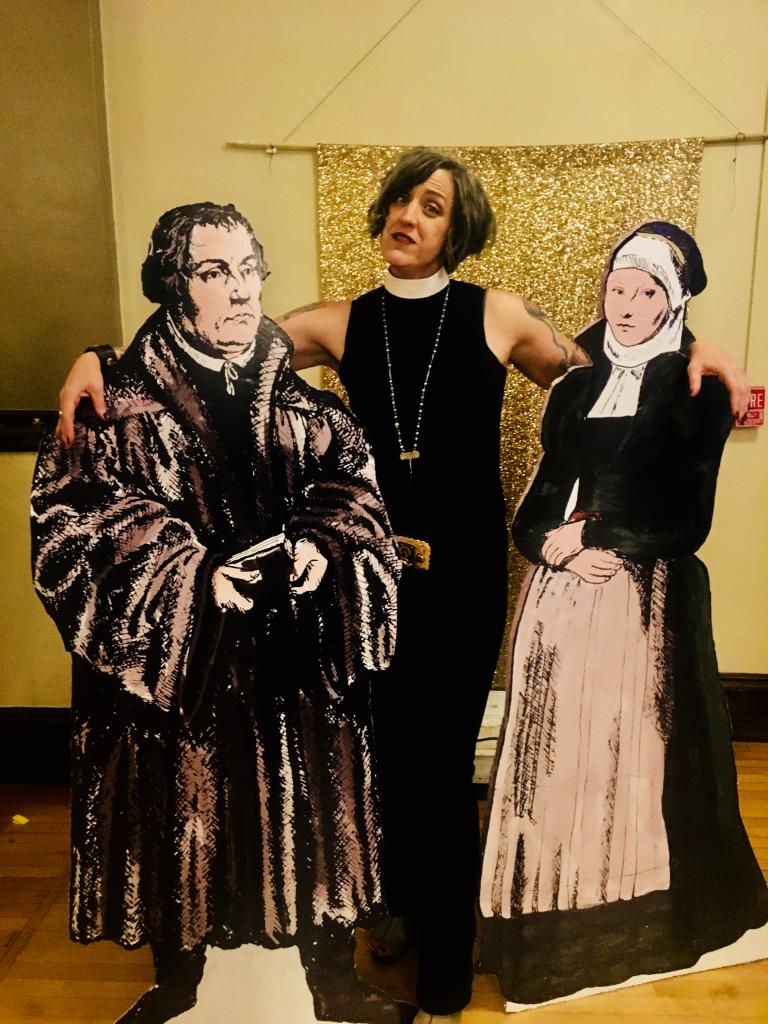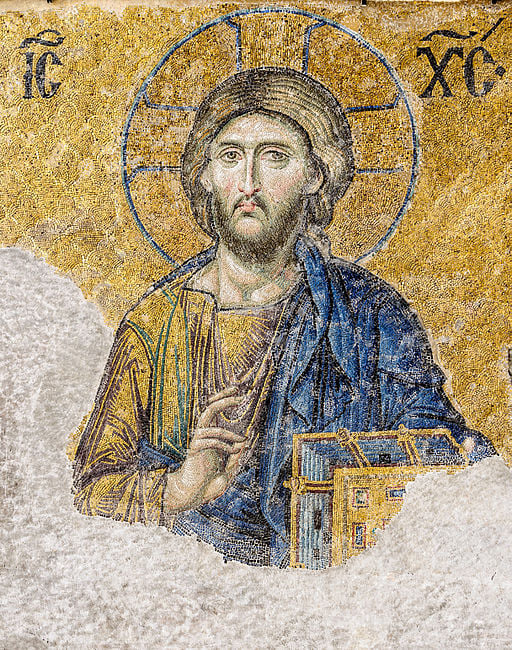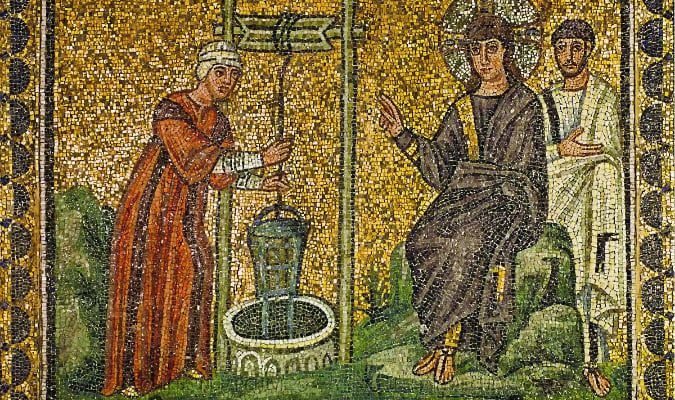
2013-10-06 nbw hfass sermon 2 <—-click here to hear a real, live preacher.
When I was a little girl, I was given a small necklace. It was a Christian necklace, see, but it held, not a little gold cross or a silver Jesus fish symbol-thing. No. Hanging from this gold chain was a small, clear, plastic orb – that contained within it a tiny round seed. You might see where this is going…it was a mustard seed. If you have faith the size of this tiny mustard seed, Jesus said, you could uproot a huge tree and throw it in the ocean.
Um, maybe you guys could help me with something here: I have never understood why, if given such vast power over physical objects, one would, out of all the options available, choose to uproot bushes and throw them into the ocean. I have no idea what good that does.
And regardless of the relative merits of mulberry bush drowning…this text has often made my faith feel inadequate. Because I’ve always heard it as this syllogism: With only a teensy weensy amount of faith, Nadia could perform miracles. Nadia does not perform miracles, therefore Nadia has so little faith it’s not even as big as that mustard seed around her neck.
Well, for the record, that necklace was super cheap and always turned my neck green so, you know, I didn’t wear it much anyhow.
This week while on the road, I had a really interesting experience around how some people struggle with what they think it means to have faith.
See, I’m basically boring myself to death out there. I mean, I’m saying the same things over and over which is downright monotonous for me, so what I really love, is doing Q and A – or as my friend Brian Calls it: Q and R Question and Response. This Thursday I spoke to about 11 hundred people on the UND campus in Grand Forks North Dakota, which I think may also be the actual population of Grand Forks North Dakota. Anyhow, it was too many people to be able to do a proper Q and A where people stand up speak and so we asked people to write down their questions instead.
And reading these questions, I realized how different it is to write something anonymously than it is to stand up and say it out loud in a room full of people. I think that’s why the prayers of the people here at House are so raw and vulnerable – in a way they wouldn’t be if people were standing up and saying their prayers out loud.
What I was struck by were the sheer number of questions that were so similar – no, not “what do your tattoos mean?” but things like, is it ok to feel distant from your faith when you are going through a really hard time in life? And… What does it even mean to have faith? And…What if I am not sure what I believe? And.. Is doubt ok? And one was really a statement and not at all a question: someone wrote: Sometimes I wonder if there really is a God because of all the hurt and suffering in life.
And so, with these questions and the texts for today rattling around in my brain, I started to think again, as I have before, about how often we assume that having faith means not doubting. We assume that having faith means not struggling with faith….that having faith means being totally trusting and peaceful and absolutely serene when really tough stuff is happening to us or around us.
But the thing is, that then, when the hard stuff in life happens, not only do we feel crappy, but then we have to add to it also feeling totally inadequate about our faith, which just makes it all worse.
I think we sometime mistakenly think having faith is like being the little engine who could – I think I can I think I can…and if we just muster up enough – a tiny mustard size amount of faith we can do anything – we can trust God when things are bad and never struggle or doubt and we can even uproot bushes into a watery grave if for some reason we think that’s what is called for.
And this Gospel text about the mustard seed kind of feels like Jesus is scolding us for not having even the tiniest amount of faith. Which can easily contribute to us thinking that if we have the right amount and the right quality of faith then the hard things in life won’t be hard and we will never doubt.
So here is the time when I say that knowing a little Greek can be helpful.
But knowing how to look up blog posts from guys who know a lot of Greek – is unbelievably helpful.
Because here’s what I learned – and forgive me for talking about grammar in a sermon, but in Greek there is a “future conditional clause”: “If you were to have the faith of a mustard seed …” — implying that you don’t have that faith now. But there is also an “according to present reality conditional clause”: meaning, “If you have the faith of a mustard seed (and you do) …” [1]
So here in Luke Jesus isn’t scolding them for not having even the tiniest amount of faith – instead when they ask him to increase their faith he’s affirming that the disciples already have the faith to do what is expected of them.
In essence, he seems to imply that they don’t need more faith, they need to realize that they already have faith and even if it’s a small amount…that’s totally enough.
It’s like Jesus is saying how much faith do you have? and I’m like I don’t know Jesus, it’s not very much it’s like this small and Jesus is saying “good enough for me!”
That’s a different message entirely isn’t it?
Which brings me back to the questions I got this week in Grand Forks. So many of them seemed to imply that people were struggling with the fact that hard things in life are hard. That somehow since they don’t have great positive feelings about God in the midst of their own suffering that this somehow means they lack faith and this worries them. For some reason we tend to think that having faith means unwavering belief, and never doubting and always no matter how awful things get, never ever having negative feelings about God and certainly never wondering if there really is a God.
It’s like we’ve forgotten the strong, and totally awesome tradition in the Hebrew Bible of complaining to God. It’s called lamenting – and we should totally reclaim this part of our tradition…I have a friend who says if you’re going to have a praise band in your church, that’s fine but only if you also have a lament band because being the people of God has always meant a whole lot of both praise and lament. And yet we think that being in a place of praise is having faith and being in a place of lament is lacking faith but that’s simply not true.
I love the way some the characters in the old testament really have it out with God – how they confront the Almighty… it’s downright argumentative. Anymore if we are angry with God we just give him the silent treatment. But not so with our ancestors in the faith. If they felt there was some serious neglectful, abusive or absentee parenting from God they…you know…complained. And their complaints were not a sign of faithlessness. Quite the opposite really. Their complaints, and their questions about God, were a sign that they were in relationship with God.
And the central theme of Habakkuk, the text we heard as our first reading is that, unlike the proud, the righteous live by their faith.
Now, when I hear the term “the righteous” I don’t know about you, but I honestly think “Ned Flanders”. It’s easy to think that the righteous means the same thing as the religious, the pius, the priggish. Those who never waver in their faith. But scholars much smarter than myself agree that “righteous” in these texts is not primarily a moral category – it’s a relational category.
The faith of the Righteous then is not as much about never doubting as it is about having a heart which longs for that which it cannot create for itself…to be righteous is to be a person – to be a people – who take the promises of God seriously enough to be unafraid of lament. Who know that doubt is as much about being in relationship with God as faith is. And Jesus was right. Even if it’s a tiny mustard seed amount, it’s enough.
So if things are hard. If you are struggling. If when it comes to God you feel more like complaining than commending, know that this too is faith. And that still it is enough. Amen.
[1] http://www.crossmarks.com/brian/luke17x5.html











